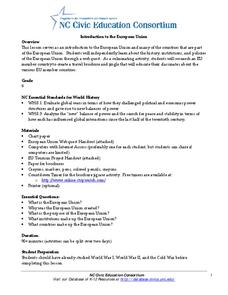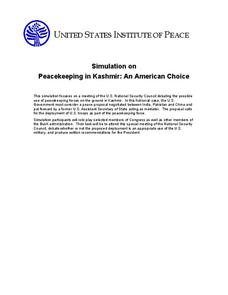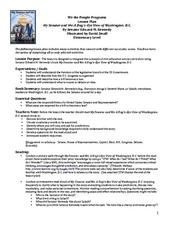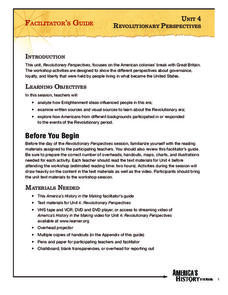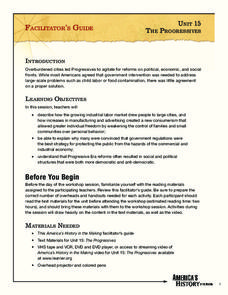Cornell University
Fibers, Dyes, and the Environment
Nanofibers can be made through electrospinning or force spinning in order to reduce the negative impact on the environment. Pupils study the role of fibers and dye on the environment through a series of five hands-on activities. Then,...
PBS
Constitution Day
Travel back to 1787 as young scholars investigate the creation of the US Constitution. After first working in small groups to create sets of classroom rules, learners go on to read a summary of the Constitution and watch a short video...
Carolina K-12
Introduction to the European Union
What is the purpose of the European Union, and what institutions and countries comprise it? Check out this resource in which class members participate in a student-led WebQuest activity designed to offer an overview of the European...
Carolina K-12
Political Parties and Conventions
The two major parties polarize many in America today, but it doesn't have to be that way in the classroom! Teach learners about political party platforms and modern campaigns with a mock political convention. After watching a PowerPoint...
Personal Genetics Education Project
Protecting Athletes with Genetic Conditions: Sickle Cell Trait
Should school and professional teams test athletes for sickle cell trait? Will it protect them by providing knowledge or lead to discrimination by not allowing them to participate in sports? After learning about this genetic disorder,...
GeorgiaStandards.org
Using Connecting Themes in First Grade Social Studies
Foster contributing members of society with a social studies unit focused on five aspects of community. First graders discuss themes of culture, groups, location, scarcity, and change with discussion questions and activities about...
Population Connection
Where Do We Grow from Here?
Did you know that the population is expected to grow to 11 billion by 2100? The resource serves final installment in a six-part series on the global population and its effects. Scholars interpret data from the United Nations about the...
North Carolina Consortium for Middle East Studies
Missing Pieces of the Puzzle: African Americans in Revolutionary Times
What's missing from most studies of the American Revolutionary War is information about the role African Americans played in the conflict. To correct this oversight, middle schoolers research groups like the Black Loyalists and Black...
US Institute of Peace
Simulation on The Cambodia Peace Settlement
Can there be peace in Cambodia? Immerse your class in a realistic negotiation setting during a riveting simulation. Learners assume the roles of key players in a group sparring with an opposing group to try to achieve peace in the midst...
iCivics
Wanted: A Just Right Government
What type of government did American colonists gain and seek after gaining their independence after the Revolutionary War? Here is lesson that will guide your young learners through the new nation's progression from the Articles of...
US Institute of Peace
Simulation on Peacekeeping in Kashmir: An American Choice
Will the United States take a stand in the Kashmir conflict? A mock meeting of the minds examines a peace proposal between China, Pakistan, and India to determine if the United States should deploy troops to the area. Individuals take on...
National Endowment for the Humanities
NAACP’s Anti-Lynching Campaign in the 1920s
Students investigate the anti-lynching campaign of the NAACP in the 1920's. In this human rights instructional activity, students prepare for and participate in a simulated debate of the Dyer Anti-Lynching Bill that was presented to...
Smithsonian Institution
Mobilizing Children
Scholars find out how the government used propaganda to mobilize children to help in the war effort. Lesson exercises include analyzing a quote from Franklin Roosevelt, viewing propaganda images and posters, and participating in a lively...
US Institute of Peace
Identifying Conflict Styles
Are you a peace-keeper or a problem-solver? Explore conflict management styles through a instructional activity, fourth in a 15-part series, that combines individual assessment and collaborative work. Groups learn the basic tendencies of...
Curated OER
My Senator and Me: A Dog's-Eye View of Washington, D.C.
Although this legislative process lesson is designed to accompany a specific text, it is valuable independently. Young learners participate in a picture walk (worksheet included) through My Senator and Me: A Dog's-Eye View of Washington,...
Annenberg Foundation
Revolutionary Perspectives
Life, liberty, and the pursuit of happiness. Learners go to the heart of the causes of the American Revolution. Examining political cartoons, Enlightenment documents, and firsthand accounts, they present their ideas and reflective...
Annenberg Foundation
The Progressives
The Progressive Era brought about a word that often leads to turmoil—change! Learners research the late 1800s in American history to uncover societal issues gripping the nation back in the day. The 15th lesson of a 22-part series...
US Institute of Peace
Advanced Mediation Practice
What will become of the giraffes of Amali? Pupils participate in a large scale role-playing activity to study the art of conflict mediation. The instructional activity engages participants in the struggle between two countries and the...
US Holocaust Museum
Defying Genocide
Defying death. Defying those who want to do harm. Defying genocide. Pupils research the events in Rwanda to gain an understanding of what it takes to survive a horrific event like a holocaust. They use video, time lines, and Holocaust...
School Improvement in Maryland
Demographic Investigation
What are the factors that influence voting patterns? How do these factors influence government funding? Is participation the squeaky wheel gets the grease? Class members interpret graphs and analyze trends to determine what demographic...
Scholastic
Debate Prompt
Should the government rate music? Are teen juries a good idea? Is space exploration worth the money? Your learners will think critically to tackle these interesting questions, and practice their ability to form persuasive arguments by...
Kids Voting USA
Kids Voting USA: K-2 Classroom Activities
Address both social studies and critical reading skills with a resource dedicated to the voting process, the American democracy, and the ability to evaluate information in order to develop a stance on an issue. Each themed activity set...
Curated OER
Great Depression and New Deal
The five activities outlined in this resource packet engage class members in projects that ask them to research the causes and the effects, both national and local, of the Great Depression and the New Deal policies of FDR.
US Institute of Peace
Simulation on Northern Ireland: One Step at a Time - The Derry March and Prospects for Peace
Where does tradition fit in a divided community with violence on both sides? Scholars learn about the marches in Northern Ireland and the many issues surrounding them. They take on roles in the community and try to convince others of...




